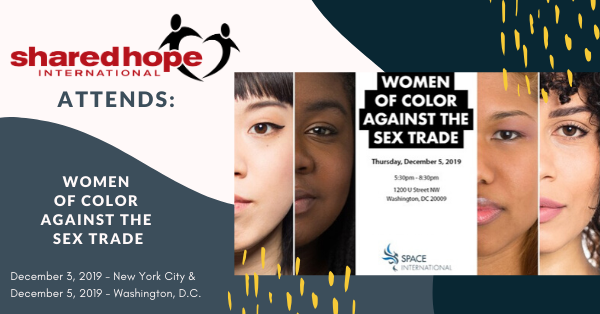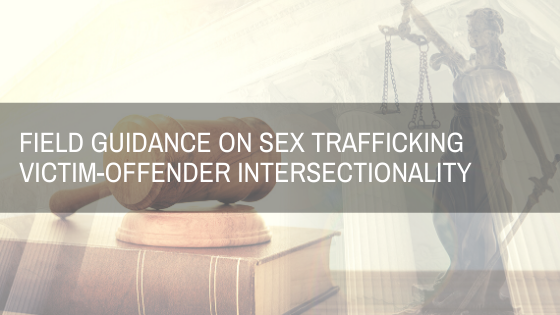The collaboration with the Institute to Address Commercial Sexual Exploitation at Villanova Law follows a three-year study of the phenomenon of treating sex trafficking victims as criminals
WASHINGTON, Jan. 23, 2020 (GLOBE NEWSWIRE) — Shared Hope International, a non-profit leader in the fight to eradicate domestic minor sex trafficking, today announced the release of “Responding to Sex Trafficking Victim-Offender Intersectionality: A Guide for Criminal Justice Stakeholders”. A collaboration of Shared Hope’s JuST Response Council and the Institute to Address Commercial Sexual Exploitation (CSE Institute) at Villanova Law, the report will serve as a field guide for criminal justice stakeholders, supporting an overall shift toward a victim-centered approach that recognizes a survivor’s underlying victimization when facing sex trafficking charges.
Shared Hope unveiled the report during a presentation and panel discussion at its Institute for Justice & Advocacy, a Washington, D.C.-based education, research and training center, which opened today.
The report provides resources for anyone who interacts with a sex trafficking victim-offender within the criminal justice system, including law enforcement, judges, defense attorneys, probation officers and victim witness advocates. It seeks to mitigate the risk of injustice when the control exerted by sex traffickers and the influence of trauma on a victim’s decision-making and behavior are not considered.
“A sea change is still needed in how our world looks at, responds to and cares for sex trafficking victims,” said Linda Smith, Shared Hope’s founder and president, and a former U.S. Congresswoman. “This report is a long-overdue resource for understanding and addressing the circumstances that result in treating victims as criminals.”
The CSE Institute educates and provides technical assistance to those who respond to commercial sexual exploitation, promoting victim-centered, trauma-informed multidisciplinary collaboration.
“As a former prosecutor who now routinely educates prosecutors and engages in policy and legislative reforms, I consistently remind prosecutors that the most powerful tool they have is the one of discretion,” said Shea Rhodes, director and co-founder of the CSE Institute. “When making decisions about which cases to charge and bring to trial, it is critical that prosecutors investigate trafficking cases using victim-centered trauma-informed strategies to ensure that the outcomes are fair and just for all involved.”
For the last decade, Shared Hope has graded states on the strength of their child sex trafficking laws through its Protected Innocence Challenge. While the national average grade rose from an F to a B since the Challenge began, the grade for victim protection laws is barely a C at 71.2 percent.
“While we recognize the challenges that arise when trafficking victims are alleged to have engaged in trafficking conduct, approaches such as charging victims as co-conspirators, which effectively deny their underlying victimization and prevent access to comprehensive services, harm victims as well as the effort to bring their exploiters to justice,” said Christine Raino, Shared Hope’s senior director of public policy. “The progress made crafting new legislation that properly punishes sex traffickers is undermined when the laws are implemented in a way that is not victim-centered and trauma-informed.”
The field guidance focuses on three primary objectives:
- To improve identification of sex trafficking victim-offenders who have come into contact with the criminal justice system
- To enhance understanding of victim-offenders’ conduct through a sex trafficking- and trauma-informed lens
- To identify alternative responses to victim-offenders that take into account the impact of their own victimization on their potential involvement in sex trafficking conduct
Shared Hope’s JuST Response Council comprises policy advocates, government officials, medical professionals, law enforcement, prosecutors, judges, academics and service providers. Several members are survivor leaders. Members share the goals of preventing juveniles from becoming sex trafficking victims and ensuring that youth who have been trafficked have access to the tools and support necessary to heal from the trauma they have endured and the skills to create and sustain a life away from trafficking.
To read the “Responding to Sex Trafficking Victim-Offender Intersectionality: A Guide for Criminal Justice Stakeholders” report, visit https://sharedhope.org/what-we-do/bring-justice/just-response-council/
ABOUT SHARED HOPE INTERNATIONAL
Founded in 1998 by then U.S. Congresswoman Linda Smith, Shared Hope International strives to prevent the conditions that foster sex trafficking, restore victims of sex slavery, and bring justice to vulnerable women and children. A non-profit Christian organization, Shared Hope engages in diverse activities that confront sex trafficking in communities throughout America. Our efforts include training first responders and community members to identify warning signs of trafficking and employ intervention techniques to rescue child trafficking victims; providing restorative services to affected children and women; and offering legislative support to those focused on strengthening laws that fight child sex trafficking. Our vision is to coordinate a national U.S. network of protection to improve the response to victims of trafficking. We believe we can create a world where every survivor is surrounded by trained professionals, an alert community, just law and policy, knowledgeable service providers and appropriate shelter options.
MEDIA CONTACT: Rosemary Ostmann, RoseComm for Shared Hope International, rostmann@rosecomm.com, 201-615-7751.








